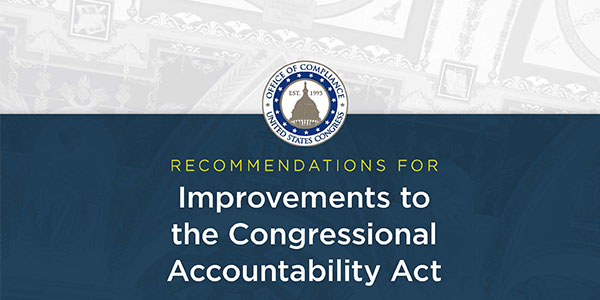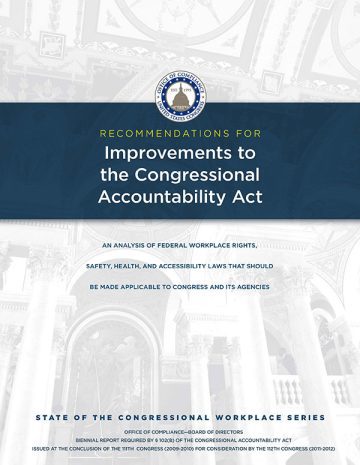Statement from the Board of Directors
We have much to celebrate as we reflect on the 15 years since the historic passage of the Congressional Accountability Act (CAA) and the establishment of the Office of Compliance (OOC). With the CAA’s passage, Congress became accountable—for the first time—under major federal civil rights statutes that apply to private sector and Federal Executive Branch employers, such as the Americans with Disabilities Act of 1990, and safety and health standards under the Occupational Safety and Health Act of 1970. Our fiscal year 2009 annual report “State of the Congressional Workplace”—released earlier this year—and other reports provide ample evidence of dramatic improvements in the state of the Congressional workplace as a result of the CAA.
In Congress’s effort to bring accountability to itself and its agencies, the CAA established the OOC to: administer a dispute resolution program for the resolution of claims by Congressional employees under the CAA; carry out an education program to inform Congressional Members, employing offices, and employees about their rights and obligations under the CAA; inspect Congressional facilities for compliance with safety and health and accessibility laws; and, under the guidance of the Board of Directors, promulgate regulations and make recommendations for changes to the CAA to keep Congress current with and accountable to the workplace laws that apply to private and public employers.
This latter role of the Board is the subject of this report. The CAA was drafted in a manner that demonstrates that Congress intended that there be an ongoing, vigilant review of the workplace laws that apply to Congress. In so doing, Congress would be held accountable under the same Federal workplace laws that apply to private businesses, the Federal Executive Branch, and the American people. At its core, § 102(b) of the CAA essentially asks the Board of Directors for the OOC to report, on a biennial basis:
(A) whether or to what degree [provisions of Federal law (including regulations) relating to (A) the terms and conditions of employment (including hiring, promotion, demotion, termination, salary, wages, overtime compensation, benefits, work assignments or reassignments, grievance and disciplinary procedures, protection from discrimination in personnel actions, occupational health and safety, and family and medical and other leave) of employees; and (B) access to public services and accommodations]1 …are applicable or inapplicable to the legislative branch, and (B) with respect to provisions inapplicable to the legislative branch, whether such provisions should be made applicable to the legislative branch. The presiding officers of the House of Representatives and the Senate shall cause each such report to be printed in the Congressional Record and each such report shall be referred to the committees of the House of Representatives and the Senate with jurisdiction.

